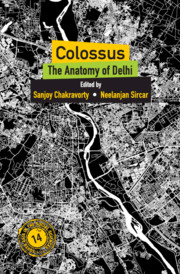14 - Pollution: Vitiated Air and Thinking about Delhi’s Environment
Published online by Cambridge University Press: 31 July 2021
Summary
The right to health coupled with the right to breathe clean air leaves no manner of doubt that it is important that air pollution deserves to be eliminated and one of the possible methods of reducing it during Diwali is by continuing the suspension of licenses for the sale of fireworks and therefore implicitly, prohibiting the bursting of fireworks.
—Supreme Court judgmentBetween the late-nineteenth century and the early twenty-first century, the question of urban air has merited much attention. Curiously though, it is only over the last three decades that academics and policymakers have begun to pay serious attention to it. In part, this may have to do with the fact that vitiated air produces chronic effects, in contrast to the epidemics on account of contaminated water that were of great concern both to the colonial state and to the postcolonial one. Related to this, it is also plausible to suggest that while water purity is seen as a universal public need, issues of air purity have for a long time been seen as the privilege of the rich or those with delicate constitutions. This obviously is no longer so, especially today when Delhi has been declared a gas chamber and smog results in the declaration of public health emergencies. Something qualitatively different has been happening in Delhi over the past three decades as environmental issues, including the issue of air pollution, have come to the fore, demanding our attention to matters of urban planning, those related to issues of science and technology, and finally that having to do with culture and religion. In this chapter, I address each of these issues, while suggesting that it would be useful to locate them in a longer history of colonial and postcolonial urbanism. This would be to mark the continuities with earlier concerns around pollution of air and signal the important ways in which air pollution is differently addressed today.
There is, at an obvious level, the primacy of the visual in concerns around air, far more in the nineteenth century than in the contemporary, but prevalent even today when pollution concerns subside with the onset of the first sunny day, the gases remaining but their presence no longer available to our senses.
- Type
- Chapter
- Information
- ColossusThe Anatomy of Delhi, pp. 362 - 382Publisher: Cambridge University PressPrint publication year: 2021

